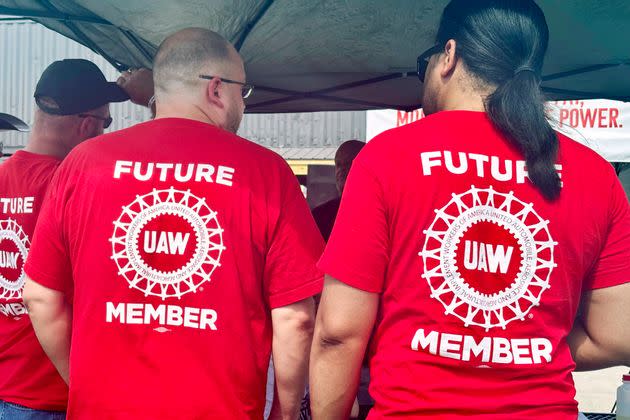Mercedes-Benz Workers In Alabama Reject Union
Mercedes-Benz workers in Alabama have voted against joining the United Auto Workers, a setback for the union as it tries to organize the auto industry in the South.
The vote count at the German manufacturer’s facilities in Vance, near Tuscaloosa, was 2,045 to 2,642 against the union, according to a preliminary tally from the National Labor Relations Board. More than 5,000 workers were eligible to cast ballots in the weeklong election that ended Friday.
The union has a week to challenge the results.
The UAW was coming off a historic victory at Volkswagen’s Tennessee plant last month, where workers had voted overwhelmingly in favor of unionization. But the loss at Mercedes could slow the union’s plans to organize more foreign-owned auto facilities in Southern states.
UAW President Shawn Fain said in a press conference following the results that the union and its supporters had “left everything on the table.”
“While this loss stings, I’ll tell you this: We’re gonna keep our heads up,” Fain said. “We fought the good fight and we’re going to continue forward. Ultimately, these workers here are going to win.”
Mercedes thanked employees for voting in a statement following the election.
“Our goal throughout this process was to ensure every eligible Team Member had the opportunity to participate in a fair election,” the company said.
But Fain accused Mercedes of engaging in “egregious illegal behavior” by pressuring employees to vote against the union.
“We’ve been here before. We know what we’re taking on,” he said. “This company, like most others, operated off the same playbook … fears, threats, intimidation.”
The UAW has long represented auto workers at the “Big Three” of Ford, General Motors and Jeep parent company Stellantis, primarily in the Midwest. But over the years, foreign manufacturers like Mercedes, Volkswagen, Nissan and Hyundai have established factories in the South to take advantage of lower wages and “right to work” laws, reducing the UAW’s density across the industry.
Organizing those plants is key to the UAW restoring its once-formidable bargaining power, and to boosting wages and benefits in Southern facilities that lag behind unionized plants.

The Volkswagen and Mercedes campaigns have served as early tests of the union’s ambitious plans, with very different results. The Volkswagen workers had voted in favor of the UAW by a nearly 3-1 margin.
But Volkswagen stayed mostly neutral during the campaign in Chattanooga, whereas Mercedes appeared to actively campaign against the UAW. Workers said management regularly corralled them into meetings to hear anti-union talking points, while the new chief executive of the company’s U.S. division made a direct appeal to workers to “give [him] a chance.”
“There’s a lot of power in that,” Fain said.
The union also faced external political pressures. Alabama Gov. Kay Ivey (R) joined other Southern GOP leaders in denouncing the UAW and declared at the start of voting that “Alabama is not Michigan.”
“The workers in Vance have spoken, and they have spoken clearly!” Ivey posted on X after the results came in Friday.
The union had said its organizing committee secured a “supermajority” of support in the plant before filing for a vote, so the results suggest it lost a large share of support in the weekslong election campaign.
Asked if the UAW planned to challenge the results based on the company’s conduct, Fain said he would leave that question to the union’s legal team.
Organizing a large manufacturing plant often involves multiple failures before succeeding. The UAW narrowly lost two earlier elections at the Volkswagen plant, in 2014 and 2019, before winning this April.
The earliest the union could file for another election at Mercedes would be in a year.
“These courageous workers reached out to us because they wanted justice,” Fain said. “They led this fight. That’s what this is all about. And what happens next is up to them.”

